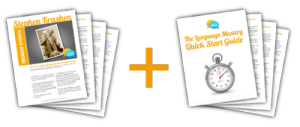Is That Word Difficult or Just Unfamiliar?
I often hear English learners and English native speakers alike complain that certain English words are “difficult” (in fact, I’ve heard the same thing said by native and non-native speakers of Japanese and Mandarin Chinese, too).
Consider the words shoe and happy. Are these English words difficult? To you and I, these terms are probably as easy and basic as they get. But what about for a 6-month old American child? Or what about for a hunter-gatherer living deep in the Amazonian rain forest who has never heard a word of English spoken or seen any English writing? For both all English words are more or less difficult, or rather, “unfamiliar”.
And that right there gets to my basic contention. There are no “difficult” words in English or any human language; there are just those words that are familiar, or as of now, unfamiliar to you.
Consider the words vapid and insipid. If you are well-read or have just studied for TOEFL, you are probably familiar with the words and would not consider them difficult. But if you were to poll the average American high school student, they would probably not know the meaning of either word despite the fact that neither represent advanced cognitive concepts (and in fact have the same basic meaning of bland, flat, dull or tedious), have few letters, and are easy to spell. These words aren’t difficult; they are just uncommon and therefore perceived as difficult to the uninitiated.
I do concede, however, that there are some words that are difficult to pronounce in certain languages. One prime example came up yesterday as I was discussing different types of cars with my girlfriend (she has just moved to Seattle and is quickly realizing how lame our public transportation system is compared with Taipei hence the need for a car). I was explaining the pros and cons of front wheel drive cars and rear wheel drive cars, when I suddenly realized what a mouthful “rear wheel drive” is when said many times fast in quick succession. The combination of R’s, L’s and W’s requires quite a bit of tongue and lips movement and can quickly wear out the mouth muscles. Similar challenges are experienced by Mandarin Chinese learners when trying to wrap their mouths around “retroflex” sounds like zh, ch, and sh, that require bending the tip of the tongue back towards the top of your mouth.
But just as the pronunciation of words that you once found hard to produce get easier and easier to say over time, so too do once “difficult” words that become clearer and clearer every time you hear, say, read or write them. And that right there is the key to learning words (and the languages in which they rest): exposure and practice.
















